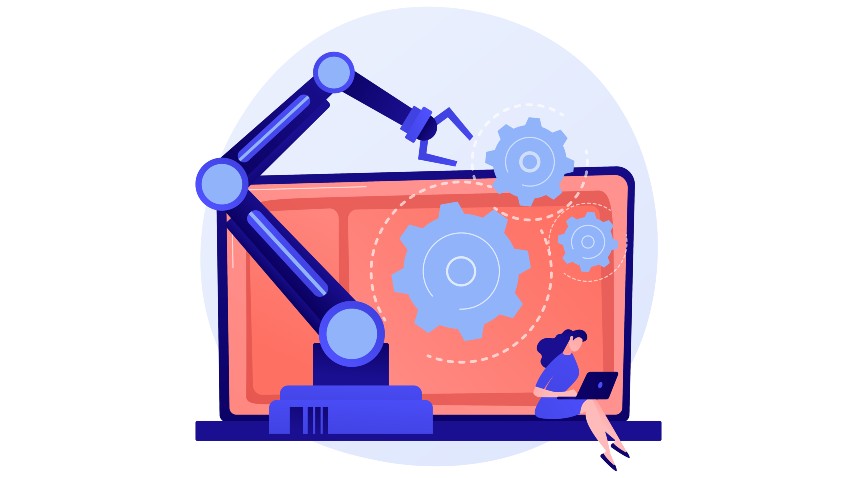
A.I. is on the rise, and for many small business owners (myself included), this feels either incredibly exciting or completely overwhelming. We are in an era of transformation in how business is done, and if we don’t pivot and streamline our business processes to keep up, it will make the ultimate difference in whether we grow or become obsolete.
It is crucial to identify what functions in your business you need to and are willing to automate so that you can do so with confidence and ease. Here are 5 questions to help you determine which processes to automate and how:
1) Is this business process or function time-consuming and repetitive?
Tasks that require a significant amount of time and are performed the exact same way in every single instance are the best candidates for automation. Even if you find that there are certain exceptions made in a process, think about ways you could standardize the task without losing its effectiveness or diminishing the value that it provides. Some examples include:
- Lead generation (customer data inputting, follow-up emails, etc)
- Administrative duties (payroll, scheduling, etc)
2) Does this business process have a high potential for human error?
Think about functions that require pulling data or information from various sources in order to produce an end result. These are typically mundane tasks that don’t require very much time or analysis, but that do require a high level of attention to detail where things could get missed if done manually. Here are a few examples:
- Customer service functions (document requests, account audits/reviews, client change requests, etc)
- Accounting (invoicing, financial reporting, accounts receivable & accounts payable)
3) Will automating this business process improve the customer experience?
This is where getting feedback from your current customers is crucial – think about what they continue asking you for in terms of the service they receive. Additionally, how can you utilize some of that saved time to create an even better customer experience for your clients? You might find that the following is true for your customers:
- Long turnaround times for change requests
- Lengthy and cumbersome input forms
- Low retention due to lack of touch points and more personalized care
4) What is the cost/benefit of automating this business process and how will it impact your employees?
Implementing any kind of change takes time and resources, but it’s crucial to evaluate just how much you’re willing to give up in the short-term to gain in the long-term. As you’re doing your research, be sure to evaluate the upfront and ongoing costs of automation tools and determine how long (if implemented properly) it will take to recover these costs and reap the benefits.
Additionally, think about the time and resources you will have to dedicate to retrain and/or upskill your employees to work alongside these automated systems. This can be a great opportunity to maximize your team members’ skill sets and increase profitability, but if some of your employees aren’t willing or able to evolve with these changes, you may even have to downsize or re-hire.
5) Is the technology you want to use to automate your business processes mature and reliable?
This is especially crucial right now as we navigate the rise of A.I., as there are new solutions being created and deployed almost every week. It’s important to evaluate your options, but in order to prevent overwhelm and confusion, be sure to ask the following questions:
- Has this technology been proven to work in similar business environments as yours?
- What is the level of support provided by the technology vendor and how often is the technology updated for ongoing improvement?
Which business processes should I not automate?
We have yet to reach the point (and hopefully never will) where virtually all functions are replaced by A.I., as there are certain processes that a machine simply wouldn’t be able to mimic with the same level of effectiveness as a human. These vary depending on your industry and the type of service you offer, but they can include:
- Hiring, Onboarding, and Professional Development: While there are certainly automation and A.I. tools for searching for ideal candidates, the process of interviewing, onboarding, and conducting performance reviews are largely dependent on cultivating a relationship with the employee. A machine can make observations about someone’s nature and how they present themselves, but that only scratches the surface in understanding what your employees need to thrive.
- Negotiations and Sales Relationships: Building relationships with clients and negotiating deals require understanding human emotions, building trust, and adapting strategies according to the situation, which are too complex for automation. A machine doesn’t have the ability to understand what’s truly at stake for the parties involved, which is why this type of transaction is better suited for humans to facilitate.
- High-Level Client Care Functions: This will vary depending on your industry, but in many service-based businesses, your retention is usually tied to the level of personalized care you offer to your clients. Healthcare, medical, or wellness services are obvious examples, but this can also apply to services like financial advisory, wealth management, or legal representation. Each client’s situation is unique, which means they require individualized attention in order to gain your trust and loyalty.
What’s the next step?
Deciding which tasks to automate for your small business requires careful consideration. By asking yourself these critical questions, you can make informed decisions that balance productivity, cost, employee well-being, and customer satisfaction. Ultimately, the goal is to strike the right balance between automated efficiency and the irreplaceable human touch, leading to sustainable growth and success in this digital age.
If you’re struggling to make a decision on automating your processes or just want to talk through a specific situation you’re facing in your business, send me an email at anais@anais.coach or click the button below to set up a call, and we can discuss how I can help.

Hi, I’m Anais – a Business & Leadership coach for service-based small business owners and leaders. I help business owners like you develop effective communication skills, dependable systems & processes, and a transparent team culture so you can reclaim the freedom and time you need to drive your business’ success. If you’re looking to go from merely surviving to THRIVING in your business, then let’s talk. Learn more about how we can work together here.
